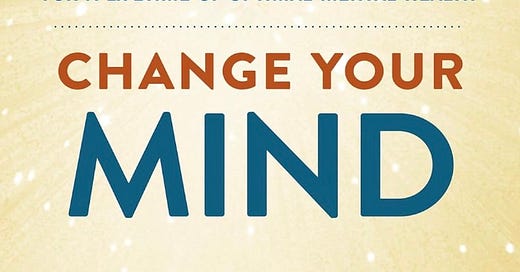AUTHOR CONFESSION: I couldn't send this newsletter in time because the internet was down in my home today. I take this newsletter very seriously, and I’ve often told many that it is sent out at 11:57 AM Eastern Standard Time on Thursdays and the video at 11:57 AM on Mondays. Sorry for the inconvenience. I’ll plan more in the future in case another internet outage occurs.
Mr. Skeptical crosses his arms, shaking his head. “I just know this book review will circle back to the carnivore diet and how it magically cures mental health.”
I pout my lips in exaggerated frustration.
He points a finger at me, smirking. “You need to include other people who’ve reviewed this book, not just your love letter to all things meat.”
I raise my hands in mock surrender. “Okay, okay, take a chill pill; I’ll include another review.”
Subconscious Fat at 30,000 Feet
In Change Your Diet, Change Your Mind, Dr. Georgia Ede argues that our modern understanding of brain-healthy diets is riddled with misconceptions. According to Ede, the mainstream recommendations to load up on plant-based diets, whole grains, and antioxidants are not just ineffective but can even be detrimental to mental health. She advocates for a shift toward animal-based diets, particularly ketogenic and low-carbohydrate strategies, which she claims are crucial for improving mood, cognitive function, and overall brain health.
Mr. Skeptical yawns loudly. “You are so predictable?”
I raise an eyebrow. “How am I predictable?”
He smirks. “Like I said before–eat more meat, fix your brain.” He puts his index finger in the air and twirls it. “Circling back to carnivore.”
“Okay, maybe I do often lead things back to going carnivore. However, is it because of that, or is it because when one understands that human brains evolved from eating cooked meat, then a book about eating more meat lowering mental health problems isn’t a surprise at all, but something foreseeable?”
Mr. Skeptical pouts his lips and looks away.
Subconscious Fat at 10,000 Feet
The book starts by saying how the mental healthcare system is overburdened. Cognitive disabilities, depression, and anxiety are skyrocketing.
Mr. Skeptical says. “A sign of the times.”
“Even scarier is that many psychiatric doctors are overwhelmed. And much of the medication given to mental health patients doesn’t fair much better than a placebo. That’s a whole other story I won’t get into here, but one can look at an article titled “Exactly how bogus is psychiatry?”
“Yeah, stick to the book.”
The book explores how food influences brain chemistry, focusing on the dangers of excess carbohydrates and insulin resistance. It explains how dietary carbohydrates contribute to mental health issues by disrupting stable brain fuel levels. The author promotes a ketogenic or carnivore diet, which she argues can stabilize brain function by providing a more consistent energy source through ketones.
“Fine, tell me something other reviewers have said about the book.”
“One review by Dr. Ronald Hoffman says he doesn’t agree with everything in the book, like his reservations on downplaying the role of fiber.”
Mr. Skeptical stands up, almost shouting, “And I agree with that. Fiber is essential.”
“I’ve already discussed fiber in the past. I’ve already written about the dumb conclusions many doctors came up with due to simple observations by a famous doctor. One can read about that here.”
Subconscious Fat at Eye-Level
One of the book’s central tenets is challenging the widely held belief in the supremacy of plant-based diets. Ede provides a nuanced critique of popular “superfoods” like grains and legumes, pointing out how their phytates, oxalates, and other compounds may interfere with nutrient absorption and even negatively impact brain health.
Mr. Skeptical comments. “Wait, are you telling me the foods I’ve been told are brain-boosting could actually harm my brain?”
“Well, Ede's analysis suggests that while some plant foods can be beneficial, they must be consumed cautiously, especially for sensitivities. She also debunks the idea that meat is harmful, emphasizing its rich nutrient profile, which includes omega-3s, vitamin B12, and amino acids critical for mental health.”
“So are we going to have mental therapists and psychiatrists recommend more meat?”
“I think that’s unlikely to happen, but it should. If I were a psychologist or psychiatrist, I’d be promoting the carnivore diet like crazy.”
“Well, you do that already.”
“True, but for men over 40 to lose weight and gain muscle, now, thanks to this book, there’s an added benefit: mental health.”
Practical Suggestions and Conclusions
“Okay,” Mr. Skeptical says, “So what should a person eat?”
“Dr. Ede outlines three dietary strategies: a moderate-carb, paleo-style diet; a more restrictive ketogenic diet; and, for those needing drastic improvements, a carnivore diet. Each approach improves insulin sensitivity, reduces inflammation, and supports brain health. While these ideas may sound extreme, Ede carefully presents them as viable options for individuals struggling with mental health who haven’t found relief through conventional means.”
"So, ditch the oatmeal and green smoothies and opt for steak?" Mr. Skeptical sighs.
“Yes, I immensely enjoyed reading the book, and it’s nice to see a prominent psychiatrist promote the carnivore diet. I, too, help my clients by guiding them in going keto or carnivore, and some can do it more quickly than others. Some of my clients don’t remain 100% carnivores and even eat some vegetables after losing the weight they want to.
In essence, the book calls for an entirely new perspective on how diet impacts the mind. Whether you’re a skeptic or a believer, Change Your Diet, Change Your Mind encourages readers to challenge the status quo in both mental health and nutrition.
Be aware.
PS Links on Facebook and Instagram. Instagram LIVE workout every Tuesday at noon Eastern time. Full disclosure: Chat GPT was used to research and enhance this post.
PSS Virtual Meet-up Meat-Up event called Carnivore Q & A on October 23, at 8 PM. This will be a LIVE event link here.




